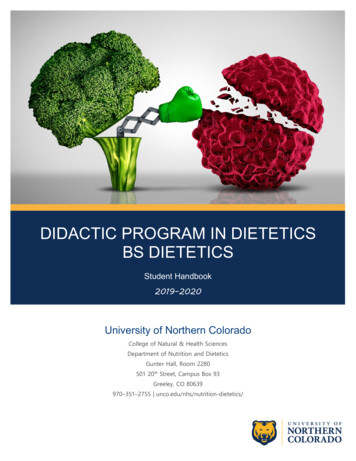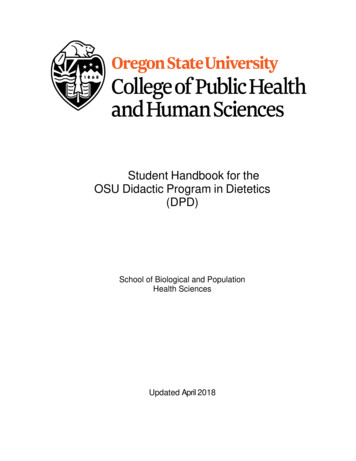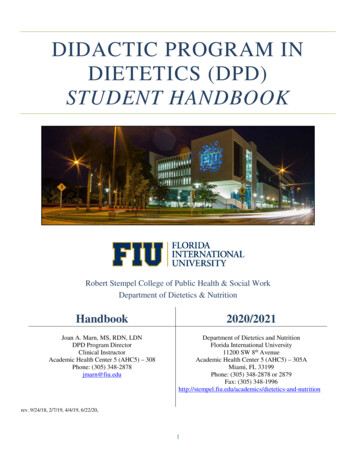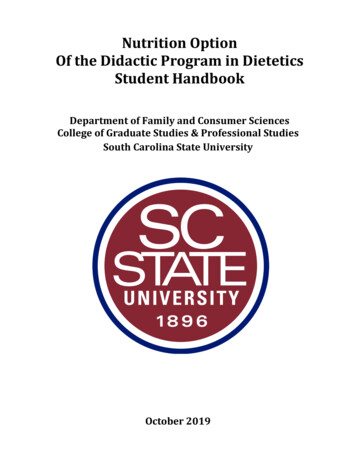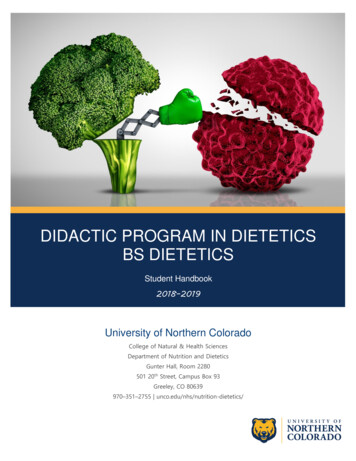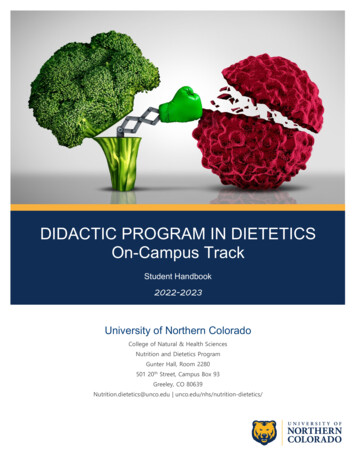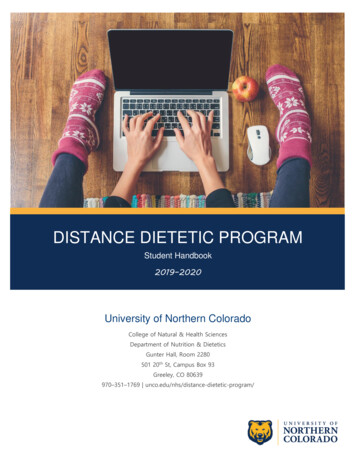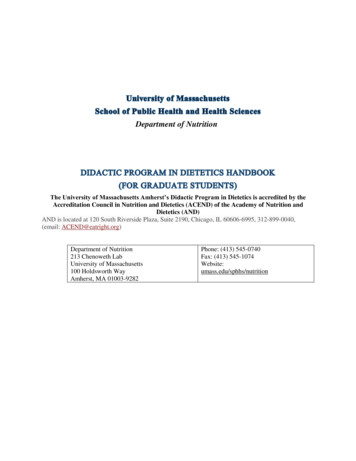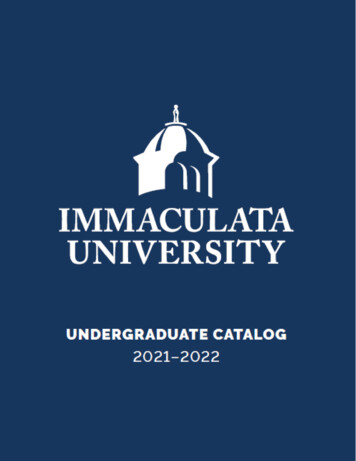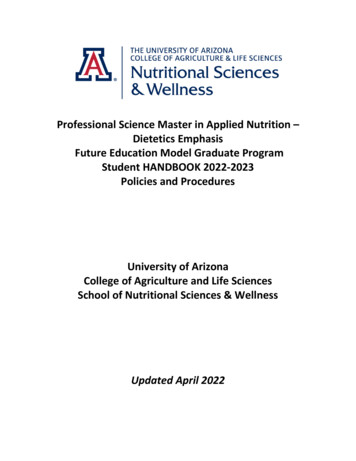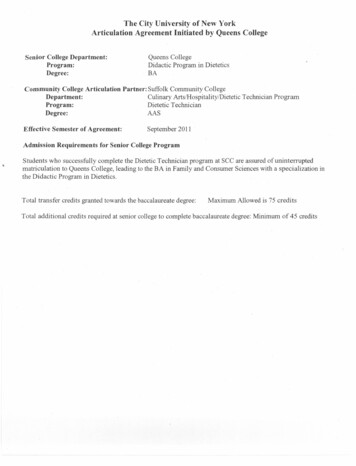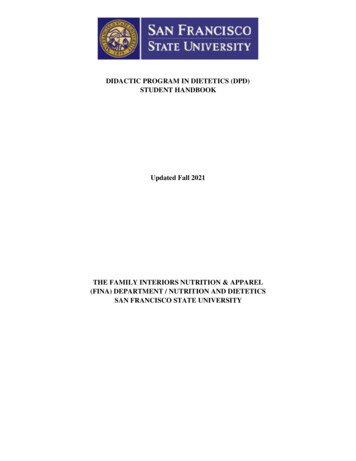
Transcription
DIDACTIC PROGRAM IN DIETETICS (DPD)STUDENT HANDBOOKUpdated Fall 2021THE FAMILY INTERIORS NUTRITION & APPAREL(FINA) DEPARTMENT / NUTRITION AND DIETETICSSAN FRANCISCO STATE UNIVERSITY
Fall 2021Dear SFSU Dietetics Students,Congratulations on being accepted into the Didactic Program in Dietetics at San Francisco StateUniversity. The DPD Handbook was developed to provide you with general universityinformation, specific information regarding our program and steps required by the Academy ofNutrition and Dietetics to becoming a Registered Dietitian or Dietetic Technician, Registered.After reading this handbook, if you have any questions, please feel free to contact me. Youshould also review the SF State Bulletin for university policies and procedures, availableat www.sfsu.edu.Jennifer Stimson, MS, RDDidactic Program in Dietetics Director1
TABLE OF CONTENTSThe SFSU DPD Program3DPD Accreditation3DPD Mission, Goals & Outcome Measures4Dietetics Program of Study5Dietetics Student Advising6Steps to Becoming a Registered Dietitian Nutritionist (RDN)7SFSU Policies & Procedures7SFSU Undergraduate Application Procedures8General University Admission Procedures9SFSU Undergraduate Admission Requirements10SFSU Evaluation of Academic Records Advanced Placement14SFSU Student Fees & Financial Aid15Privacy Rights of Students in Education Records15SFSU Registration Policies17Miscellaneous SFSU Enrollment Policies19Academic Standards for Undergraduate Students21Graduation Requirements23Verification Statement Procedures23Student Code of Ethics24Special Policies Related to Classroom Activities25Laboratory Policies, Procedures & Responsibilities26Student Nutrition and Dietetic Association (SNDA)27Application to Supervised Practice (Dietetic Internships)27Requests for Letters of RecommendationAppendices27A – Program FacultyB - 2017 ACEND Accreditation Standards for Nutrition & Dietetics DidacticPrograms (DPD)28C - Program Costs40D – Immunizations41E- AND Code of Ethics for Nutrition & Dietetics Profession42292
THE SFSU DPD PROGRAMBackground of the Didactic Program in Dietetics/B.S. in Nutrition and DieteticsThe current DPD has evolved over a three-decade period at SFSU. The first offering of adietetics program was in the early 1970s using the Academy of Nutrition and Dietetics’ (AND),formerly The American Dietetic Association (ADA), Plan III guidelines. Under the HomeEconomics Department, students received a B.A. in Home Economics with an emphasis indietetics. In the late 1970s, the program was in compliance with ADA’s Plan IV standards. Thefaculty felt, however, that a B.S. degree would allow more breadth and depth in thecompetencies specified for dietetics by the ADA. The B.S. in dietetics, meeting Plan IVrequirements, first appeared in the SF State Bulletin in the fall of 1982 after having beenapproved by the Academic Senate and the Chancellor’s Office of the California StateUniversities and Colleges in 1981. The curriculum was approved by ADA in 1981 and, withminor modifications of courses and descriptions, has been in effect ever since. In 1990, thecurriculum was modified to meet the Plan V guidelines and the Standards of Education. TheDPD currently meets the 2017 Eligibility Requirements and Accreditation Standards of theAccreditation Council for Education in Nutrition and Dietetics (ACEND) of The Academy ofNutrition and Dietetics.DPD ACCREDITATIONThe University is accredited by the Western Association of Schools and Colleges (WASC). Theprograms in the Department of Consumer and Family Studies/Dietetics are accredited under theAmerican Association of Family and Consumer Sciences (AAFCS). The B.S. in Dietetics is anaccredited Didactic Program in Dietetics (DPD) and meets the 2017 Eligibility Requirements andAccreditation Standards of the Accreditation Council for Education in Nutrition and Dietetics(ACEND) of The Academy of Nutrition and Dietetics. The accreditation process requires adetailed description of how the Didactic Program in Dietetics at SF State meets the ACEND2017 Eligibility Requirements and Accreditation Standards. The San Francisco State UniversityDidactic Program in Dietetics is currently granted continuing accreditation by:The Accreditation Council for Education in Nutrition and Dietetics ofThe Academy of Nutrition and Dietetics120 South Riverside Plaza, Suite 2190Chicago, IL 60606-6995(800) 877-1600 ext. acend3
DPD MISSION, GOALS & OUTCOME MEASURESThe mission of the San Francisco State University Didactic Program in Dietetics (DPD) is toprovide quality dietetics education and training in the areas of foods, nutrition, medicalnutrition therapy and foodservice management. The program’s goals aim to preparestudents for supervised practice, ultimately leading to eligibility for the CDR credentialingexam to become registered dietitian nutritionists. Graduates of the program will beprepared to work with culturally diverse populations and to serve the present and futurenutrition needs of individuals, families, consumers and the institutions, industries, andbusinesses serving them.Goal 1: Graduates will be prepared for supervised practice programs.Objective 1.1: At least 80 percent of program students’ complete program/degree requirementswithin six years (150% of the program length).Objective 1.2: At least 60 percent of program graduates apply for admission to a supervisedpractice program prior to or within 12 months of graduation.Objective 1.3: At least 50 percent of program graduates are admitted to a supervised practiceprogram within 12 months of graduation.Objective 1.4: The program’s one-year pass rate (graduates who pass the registration exam withinone year of first attempt) on the CDR credentialing exam for dietitian nutritionists is at least 80%.Objective 1.5: At least 80% of supervised practice program directors surveyed will indicate theyare satisfied/very satisfied regarding interns’ skills related to job functions.Objective 1.6: At least 80% of DPD graduates who respond to the survey will indicate that theywere satisfied with the knowledge they gained on the ACEND Core Knowledge Requirements.Goal 2: Graduates will demonstrate an understanding of cultural diversity and the importance ofcultural competence.Cultural knowledge: the process of learning about world views of other cultures; culturalawareness: the process of becoming aware of own learned biases and prejudices toward othercultures through self-assessment and awareness of beliefs and practices of others; culturalsensitivity: awareness of your own cultural beliefs, assumptions, customs, and values as well asthose of other cultural groups without assigning values to these differences and culturalcompetence: a set of knowledge and interpersonal skills that allows individuals to understand andappreciate cultural differences and similarities and to work effectively in cross-cultural situations2.1: At least 80% of the DPD seniors surveyed will indicate satisfactory scores with respect to“understanding diversity concepts through the development and execution of a final semesterteaching module project (NUTR 551 Nutrition Education and Communication).”2.2: At least 80% of supervised practice program directors surveyed will indicate they aresatisfied/very satisfied regarding interns’ cultural competence.4
DIETETICS PROGRAM OF STUDYStudents in the Nutrition Science Concentration of the Nutrition and Dietetics major shouldconsult the designated DPD director/advisor at least once per semester. Advisors will assist inplanning future coursework and evaluation of courses transferred from other institutions. Studentsshould consult the course description in the current Bulletin for prerequisites and co-requisites.The link, cs-conc-nutrition-science/#degreerequirementstext, identifies majorrequirements.The B.S. in Nutrition and Dietetics major, Nutrition Science Concentration is a 120-unit degree withthree components consisting of General Education Prerequisites, Institutional Requirements andProfessional Requirements.General Education - The first component is 48 units of General Education. Areas A through Dof GE contain lower division classes and should be taken in the first two years. They providebasic skills as well as breadth in a variety of disciplinary areas. Area A of GE is designed toimprove student’s basic skills in communication in English (oral and written) and criticalthinking. Area B of GE provides breadth of knowledge about the physical and life sciences,including laboratory experiences. Area B also provides students an opportunity to expand theirmathematics and quantitative reasoning skills. Area C of GE focuses on the Arts and Humanitiesand gives students a chance to explore the Humanities through literature. Area D of GE coversthe social sciences and includes the US History and Government requirements. Area E: LifelongLearning and Self-Development (LLD), gives students an opportunity to explore themselves andthe ways in which they interact with the world around them. These classes can be upper or lowerdivision and many students will take more than one of them. For the B.S. degree in dietetics,students must complete 15 units of specific General Education courses, which meet dieteticcompetencies. These courses are prerequisites for being admitted into the Nutrition and Dieteticsmajor: statistics, psychology, microbiology with laboratory, and general chemistry, in addition tointroductory nutrition, for a total of 18 units. These courses double count toward the GeneralEducation requirements of the university as well as Nutrition and Dietetics major requirements.Professional Requirements - The second component is the Professional Requirements whichrebuild on the foundational prerequisites, to be completed with a grade of C- or better as acondition of enrollment as well as graduation, unless otherwise noted. The Graduate WritingAssessment Requirement (GWAR) class NUTR 353 must be passed with a minimum C grade.The professional courses include anatomy, organic chemistry, foodservice systems management,and foods, production and service, physiology and lab, biochemistry, nutrition in the lifecycle,experimental foods, advanced nutrition I and II, medical nutrition therapy I and II, managementof quality food purchasing and production, nutrition education and communication, communitynutrition and assessment, hospitality human resources management. These courses total 49 unitsof competency courses.Elective Requirements – There is one required elective course. The electives focus on thefollowing areas: foodservice systems management, clinical nutrition/patient care, and communitydietetics. The elective must be taken for a letter grade. The Professional Requirements, alongwith the Foundation Requirements, provide the primary focus for the ACEND Foundation5
Knowledge Requirements and Learning Outcomes for DPD programs including: Scientific andevidence base of practice, professional practice expectations, clinical and customer services,practice management and use of resources, and support knowledge (food and food systems,physical and biological sciences, and behavioral and social sciences).The DPD bulletin lists the current program requirements. To review the courses listed above andsee the list of approved electives, review the bulletin textMinimum Expectations of Students in DieteticsAll courses must be completed with a 2.0 grade point average and no grade below a C-. Allcourses must be completed with a letter grade. Satisfactory competence is expected in all of theAND’s knowledge and skill requirements, based on faculty and self-evaluations. To receive adegree from SF State the requirements are that students have an overall GPA of 2.0. Studentsare expected to complete the DPD in a reasonable amount of time, not to exceed six years.Students will receive a Verification Statement, signed by the DPD Director, on completion of thedegree and submission of an official transcript indicating that the degree has been awarded. TheVerification Statement is then submitted as a part of the dietetic internship application process.DIETETICS STUDENT ADVISINGNew Student AdvisingThe DPD Director conducts new and prospective student informational meetings each fall andspring semester. Incoming students are encouraged to attend these meetings to become morefamiliar with the program, departmental policies and advising procedures.Declared MajorsOnce a student has declared their major as Nutrition and Dietetics with a Nutrition ScienceConcentration, they will be assigned a nutrition faculty advisor for approval and evaluation ofcourses transferred from other institutions. For approval of courses, students must presenttranscripts and course descriptions taken at other institutions. Once approval is given, it isupdated in the student’s record. All courses in the major are to be approved by a designatedfaculty member or the DPD Director.Students are to meet with their advisor at least once per semester to plan for a timely graduation.Evidence of prerequisite completion for the senior professional courses is required for verificationof enrollment in these courses. An unofficial transcript is acceptable.Students should be aware of the need to present this updated information at the beginning of eachsemester of the senior year professional courses as proof of prerequisites. Lack of proof ofprerequisite completion may result in a student being dropped from a class on the first day ofclasses.Advising office hours can be found by emailing your advisor. If you are unsure the FINA officecan direct you to the appropriate advisor. Most faculty prefer contact through email.6
STEPS TO BECOMING A REGISTERED DIETITIAN NUTRITIONIST (RDN)The Registered Dietitian is the food and nutrition expert. To become a RegisteredDietitian Nutritionist the following steps must be taken:1. Complete a bachelor's degree and receive a verification statement from an ACENDaccredited program (Didactic Program in Dietetics, Coordinated Program, FutureGraduate Program, Foreign or International Dietitian Education Program) Note,effective January 1, 2024, a graduate degree will be required to be eligible to takethe Commission on Dietetic Registration. (Dietetic registration exam.)2. Complete an ACEND-accredited supervised practice dietetic internshipprogram or Individual Supervised Practice Pathway is an option. Supervisedpractice/experiential learning is combined with the Coordinated Program, Future GraduateProgram, and International Dietitian Education Program.3. Pass the Commission on Dietetic Registration's dietetic registration exam.4. Gain licensure in your state of practice, if applicable.5. Maintain continuing education.Other Pathways to Become an RDNCoordinated Programs in DieteticsCombine your degree with supervised practice. Why? Because baccalaureate students can apply to thistype of program and begin supervised practice without going through dietetic internship computermatching. Coordinated Programs in Dietetics may result in a bachelor's, master’s, or doctoral degree,depending on the program. Graduates of these programs are eligible to sit for the dietetic registrationexam.Career ChangersIt is never too late to make the switch to a career in dietetics. Individuals with a prior bachelor's degreeneed to complete a Didactic Program in Dietetics and receive a verification statement. Those without afour-year degree need to complete a bachelor's degree and receive a verification statement indicatingcompletion of the didactic program in dietetics components prior to applying to the dietetic internshipmatch.International StudentsRDNs have been trained in all corners of the globe. There a few different ways for international learnersto become RDNs — visit ACEND to learn more.*Beginning in 2024, a minimum of a master's degree will be an eligibility requirement in order to takethe CDR dietetic registration exam.SFSU POLICIES & PROCEDURESThe SFSU DPD Student Handbook is available to all students and is used by students while inthe DPD. University policies and procedures may be found in the online catalogue, the Bulletinhttp://bulletin.sfsu.edu/#381303, on the university website.7
SFSU UNDERGRADUATE APPLICATION PROCEDURESSFSU accepts applications from prospective students for part-time or full-time undergraduateprograms of study in day or evening classes. Undergraduate applicants must file a completeundergraduate application at www.csumentor.edu and submit an application fee. The applicationfee may not be transferred or used to apply to another term. The applications of person’s deniedadmission to an impacted campus may be re-routed to another campus, but only if the applicantsare CSU eligible.Application AcknowledgmentStudents applying on-line on CSU Mentor will receive an e-mail acknowledgement as soon as theapplication is successfully submitted, and a confirmation number is issued. A notice is sent bythe campus requesting submission of academic records necessary for the campus to evaluate thestudent's qualifications. Applicants may be assured of admission if the evaluation of relevantqualifications indicates that applicants meet CSU admission requirements and campusrequirements for admission to an impacted program. An offer of admission is not transferable toanother term or to another campus.Notification of AdmissionApplicants who have received an application receipt notice and have submitted all requiredadmission materials will begin to receive notification of acceptance or denial of admission to thefall semester on November 1. If the processing schedule permits, some applicants may benotified in advance of these dates.Hardship PetitionsThe campus has established procedures for consideration of qualified applicants who would befaced with extreme hardship if not admitted. Petitioners should enclose with their applications astatement of the hardship situation. The application and statement should be sent to the Directorof Undergraduate Admissions.Second Bachelor’s StudentsCurrently SF State is not accepting 2nd bachelor’s students due to budget cuts. However, theDPD currently does accept 2nd bachelor’s students and they must file a complete graduateapplication at www.csumentor.edu and submit an application fee. All prerequisites must becompleted and/or in progress for admission into the program. This includes Psychology,Microbiology plus lab, Statistics, General Chemistry, and College- level Nutrition for ScienceMajors. We have a minimum 3.0 GPA requirement.Second Bachelor's students do not have to complete an entire second degree; only the 71 units ofthe DPD to qualify for a Dietetic Internship is needed to receive the degree in dietetics.Typically, we will not consider course work from degrees earned more than 10 years ago. Ifsomeone has significant work experience in the field of nutrition/dietetics and/or have a graduatedegree, course work may be considered. For someone who has significant course work that mayarticulate into our program (sciences, nutrition, or dietetics), a transcript review is recommended.Official transcripts, course descriptions, and a check made payable to “FINA” for 50.00 andmailed to the DPD Director c/o FINA, 1600 Holloway Ave., BH 329, San Francisco, CA 94132,is required for completion of the review.8
International Degree StudentsFor someone who has significant course work that may articulate into our program (sciences,nutrition, or dietetics), a transcript review is recommended. All non-U.S. transcripts must bereviewed by an outside transcript review agency. Please refer to the Academy of Nutritionand Dietetics page ree-evaluation-agencies.Official transcripts, course descriptions, and a check made payable to “FINA” for 50.00 andmailed to the DPD Director c/o FINA, 1600 Holloway Ave., BH 329, San Francisco, CA94132, is required for completion of the review.GENERAL UNIVERSITY ADMISSION PROCEDURESRequirements for admission to San Francisco State University are in accordance with Title 5,Chapter 1, Subchapter 3, of the California Code of Regulations. Undergraduate applicants whoare unsure of these requirements should consult a high school or community college counseloror San Francisco State University's Admissions Office. Complete information is available atwww.csumentor.edu/planning/.Electronic CSU undergraduate and graduate applications are available at www.csumentor.edu/.The CSU Mentor system allows students to browse through general information about CSU's 23campuses, view multimedia campus presentations, send and receive electronic responses tospecific questions, and apply for admission and financial aid.Applying online via www.csumentor.edu/ is encouraged, and admissions decisions are usuallyexpedited, when on-line applications have been submitted. Application in "hard copy" formmay be obtained online or from the office of Admissions at any of the campuses of theCalifornia State University.Students without on-line access should contact any California high school, community college,or Office of Admissions at any of the campuses of the California State University.Application Filing PeriodsApplication periods for San Francisco State University may change. For the most currentinformation, see the Prospective Students page at https://future.sfsu.edu/. Students must meetall the university admission requirements.Filing Period DurationEach campus accepts applications until capacities are reached. Many campuses limitundergraduate admissions in an enrollment category due to overall enrollment limits. Ifapplying after the initial filing period, consult the CSU Mentor Application Status Report forextended application filing deadlines.Importance of Filing Complete, Accurate, and Authentic Application DocumentsSF State advises prospective students that they must supply complete and accurate informationon the application for admission, residence questionnaire, and financial aid forms. Further,applicants must submit, when requested, authentic and official transcripts of all previous9
academic work attempted. Failure to file complete, accurate, and authentic applicationdocuments may result in denial of admission, cancellation of academic credit, suspension, orexpulsion (Section 41301, Article 1.1, Title 5, California Code of Regulations).Cancellation of AdmissionAdmission will be cancelled automatically if a student is accepted by San Francisco StateUniversity for a given semester and does not register for that semester. If the student wishesto undertake work at the university at a later date, they must file a new application, pay a newapplication fee, and meet the requirements for admission in effect at the time of admission.ReservationThe university reserves the right to select its students and deny admission to the university or anyof its programs as the university, in its sole discretion, determines admittance based on anapplicant's suitability and the best interests of the university.SFSU UNDERGRADUATE ADMISSION REQUIREMENTSTest RequirementsThe ACT or the SAT of the College Board, test scores are used for advising and placementpurposes. Registration forms and dates for the SAT or ACT are available from school orcollege counselors. Or an applicant may write to or call:The College Board (SAT)Registration Unit, Box6200 Princeton, NJ08541-6200(609) 771-7588www.collegeboard.orgACT Registration UnitP.O. Box 414Iowa City, IA52240(319) 337-1270www.act.orgTOEFL Requirement. All undergraduate applicants whose native language is not Englishand who have not attended schools at the secondary level or above for at least three yearsfull time where English is the principal language of instruction must present a minimumscore of 500 on the Test of English as a Foreign Language (TOEFL) or 173 on the computerbased TOEFL.Second baccalaureate applicants must present a score of 550 on the paper-based test or 213 onthe computer-based test. Students who attended a secondary level educational institutionwhere English was the principal language of instruction for at least three years full time willnot be held to the TOEFL admission requirement. Institutional TOEFL scores are notaccepted. Campuses specify the conditions for meeting the requirement of three years fulltimeEnglish language instruction. Achieving the minimum TOEFL score shall be evidence of theapplicant's English competency at a level that will allow the applicant to participatesatisfactorily in and benefit from university study. For complete information regardingTOEFL, go to www.toefl.org.10
System-wide Placement Test RequirementsA note for fall 2021 and fall 2022 first-time freshman: The California State University (CSU) hastemporarily suspended the use of ACT/SAT examinations in determining admission eligibility forall CSU campuses for the 2021-2022 academic year. This temporary change of admissioneligibility applies only for fall 2021, winter 2022, spring 2022, fall 2022, winter 2023, and spring2023 admission cycles.First-time Freshman ApplicantsFreshman applicants can now choose to be admitted into the Nutrition and Dietetics majorwith the Nutrition Science Concentration. A first-time freshman is a student who has earnedno college credit beyond the summer immediately following high school graduation.Generally, first-time freshmen applicants qualify for regular admission if they: Having graduated from high school, have earned a Certificate of General EducationDevelopment (GED) or have passed the California High School ProficiencyExamination; and Have qualifiable minimum eligibility index (see Eligibility Index below), and Have completed with grades of C or better each of the courses in the comprehensivepattern of college preparatory subject requirements (see Subject Requirements).Eligibility Index—The eligibility index is the combination of the high school grade point averageand scores on either the ACT or the SAT. The grade point average is based on the final threeyears of high school study in all college preparatory "a-g" subject requirements and bonus pointsfor approved honors courses. (See Honors Courses below).The CSU Eligibility Index (EI) can be calculated by multiplying the grade point average by800 and adding the total score on the mathematics and critical reading scores of the SAT.Students, who took the ACT, multiply the grade point average by 200 and add ten times theACT composite score. California high school graduates (or residents of California for tuitionpurposes) need a minimum index of 2900 using the SAT or 694 using the ACT.Persons who neither graduated from a California high school nor are residents of California for tuitionpurposes need a minimum index of 3502 (SAT) or 842 (ACT). Graduates of secondary schools inforeign countries must be judged to have academic preparation and abilities equivalent to applicantseligible under this section.An applicant with a grade point average of 3.00 or above (3.61 for nonresidents) is notrequired to submit test scores. However, all applicants for admission are urged to take theSAT or ACT and provide the scores of such tests to each CSU to which they seek admission.Campuses use these test results for advising and placement purposes and may require themfor admission to impacted majors or programs. Impacted CSU campuses require SAT or ACTscores of all applicants for freshman admission.Honors Courses—Up to eight semesters of honors courses taken in the last three years of highschool, including up to two approved courses taken in the tenth grade, can be accepted. Eachunit of A in an honors course receives a total of 5 points; B, 4 points; and C, 3 points.11
NOTE: A grade point average of 3.00 and above qualifies with any score on the ACT or SAT. Agrade point average of below 2.00 does not qualify for regular admission.Subject RequirementsThe California State University requires that first-time freshman applicants complete, withgrades of C or better, a comprehensive pattern of college preparatory study totaling fifteenunits. A "unit" is one year of study in high school. 2 years of social science, including 1 year of U.S. history, or U.S. history andgovernment;4 years of English;3 years of mathematics (algebra, geometry, and intermediate algebra);2 years of laboratory science (1 year of biological science and 1 year of physical science,both with labs);2 years in a language other than English (subject to waiver for applicants demonstratingequivalent competence);1 year-long course in visual and performing arts (art, dance, drama/theater, or music);1 year of electives selected from English, advanced mathematics, social science, history,laboratory science, foreign language, visual and performing arts, or other coursesapproved and included on the UC/CSU “a-g” list.Subject Requirement Substitution for Students with DisabilitiesApplicants with disabilities are encouraged to complete college preparatory course requirementsif at all possible. If an applicant is judged unable to fulfill a specific course requirement becauseof their disability, alternate college preparatory courses may be substituted for specific subjectrequirements. Substitutions may be authorized on an individual basis after review andrecommendation by the applicant's academic adviser or guidance counselor in consultation withthe director of a CSU disabled-students services program. Although the distribution may beslightly different from the course pattern required of other students, students qualifying forsubstitutions will still be held for fifteen units of college preparatory study. Students should beaware that co
THE SFSU DPD PROGRAM Background of the Didactic Program in Dietetics/B.S. in Nutrition and Dietetics The current DPD has evolved over a three-decade period at SFSU. The first offering of a dietetics program was in the early 1970s using the Academy of Nutrition and Dietetics' (AND),
